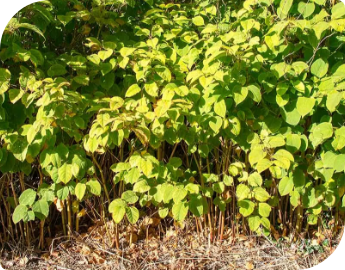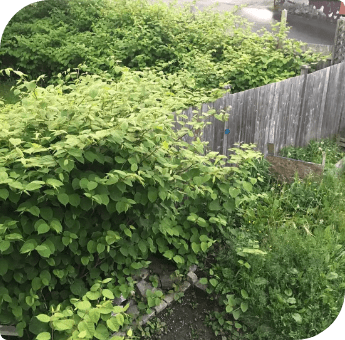Is it illegal to have Japanese knotweed in your garden?
No, it is not illegal to have Japanese knotweed in your garden in the UK. However, it is a legal obligation to prevent it from spreading into the wild or onto neighbouring land, as causing it to spread is considered an offense under the Wildlife and Countryside Act 1981. If you identify the plant on your property, you are legally responsible for taking action to control it and ensuring it does not spread to other areas.
Should I be worried if my neighbour has Japanese knotweed?
Yes, you should be worried if your neighbour has Japanese knotweed. This plant is known for its aggressive and rapid spread, with roots (rhizomes) capable of extending up to 7 meters horizontally underground, potentially encroaching onto your property. Its presence can cause structural damage to buildings, affect property value, and lead to difficulties with mortgages. It's advisable to communicate with your neighbour and, if necessary, seek professional advice, as its spread is legally prohibited.
What is the 7 metre rule for Japanese knotweed?
The "7 metre rule" for Japanese knotweed is an informal guideline used by surveyors and mortgage lenders in the UK. It refers to the plant's aggressive growth, where its underground rhizomes can spread up to 7 meters (23 feet) horizontally from the visible plant. If Japanese knotweed is found within this 7-meter radius of a property or boundary, it can be flagged as a risk, potentially affecting property value and mortgage eligibility. Our free on-site survey evaluates and confirms the presence and spread of Japanese knotweed on your land.
Can I sell my property if there is Japanese knotweed in the garden?
You can, but you have to mention it to your estate agent and potential buyers. You are legally responsible for informing your council about its presence and for not spreading the plant.
If this plant is so serious, can it be the reason I don’t get a mortgage?
That would depend on the lender. Some may reject your mortgage application, but others may rely on a report from a surveyor. The surveyor evaluates the risk of the property and whether it can be sold in the future. Some lenders may even request you hire a Japanese knotweed removal service before they approve your application.
Why should you not cut Japanese knotweed?
You should not cut Japanese knotweed without proper follow-up treatment because it can actually worsen the problem. This type of weed is very resilient and stubborn; cutting it can stimulate its growth, causing it to spread rapidly from even the tiniest root remaining in the soil (as small as 2mm). Furthermore, improper disposal of cuttings is legally restricted, as Japanese knotweed is classified as controlled waste. DIY weeding is often pointless and can make professional treatment more challenging.
Why can't you touch Japanese knotweed?
You are advised not to touch Japanese knotweed or disturb it without proper precautions because it can spread very easily from even tiny fragments. Touching or attempting to remove it yourself can cause small pieces of its highly resilient stem or root (rhizome) to break off. These fragments can then be inadvertently transported to other areas via clothing, tools, or vehicles, leading to new infestations. While it's not directly toxic, its rapid spread is a significant problem, and preventing it from doing so is a legal obligation.
Can you spread Japanese knotweed by walking on it?
Yes, Japanese knotweed can easily be spread by walking on it. Tiny fragments of the plant's stem, leaves, or particularly its resilient rhizomes (underground stems) can break off and get caught on shoes, clothing, or even pet fur. These fragments can then be inadvertently transported to other areas, where they can readily root and establish new plants. This highlights why DIY weeding is often pointless and why professional control methods prioritize containment and safe disposal.
Why can't I remove Japanese knotweed?
You cannot effectively remove Japanese knotweed yourself due to its extreme resilience and rapid regrowth capabilities from even tiny root fragments (as small as 2mm). Furthermore, improper handling and disposal of the plant are legally restricted under the Environmental Protection Act 1990, as it's classified as controlled waste. Successfully eliminating all stages of its lifecycle requires expert products and solutions, such as stem injection, herbicide treatment, or excavation, performed by professional knotweed control companies.
What kills Japanese knotweed permanently naturally?
There is currently no scientifically proven natural method that permanently kills Japanese knotweed. Its extensive and resilient rhizome system makes it incredibly difficult to eradicate without chemical treatments or specialized excavation. While some natural substances might temporarily suppress growth, they will not eliminate the plant's deep-rooted network.
How deep do you have to dig to get rid of Japanese knotweed?
To effectively get rid of Japanese knotweed through excavation, you typically have to dig at least 2 to 3 meters (7-10 feet) deep to remove all rhizomes (underground stems), and extend up to 7 meters laterally from the visible plant. This is because the plant can regrow from even tiny root fragments. This method requires a lot of effort and specialist expertise to identify and remove all subterranean growth, making professional excavation, sifting, and screening services necessary for complete eradication.
Can I dispose of Japanese Knotweed with my other garden waste?
No, you cannot. Japanese Knotweed is classified as controlled waste under the Environmental Protection Act 1990. This plant should be disposed of in specifically licensed landfills and only by licensed waste carriers.
Does the council remove Japanese knotweed?
Local councils typically do not remove Japanese knotweed from private property. Their responsibility usually lies with controlling it on public land or intervening if a private infestation is causing a nuisance or spreading onto public property. If Japanese knotweed is discovered on private land, the landowner is legally obligated to manage and prevent its spread. Our service provides professional Japanese knotweed identification and treatment to assist landowners in fulfilling this responsibility.
Who should I report Japanese knotweed to?
If you discover Japanese knotweed on your property, you are legally responsible for declaring its presence and preventing its spread. If the knotweed is on a neighbour's property and spreading to yours, you should first discuss it with your neighbour. If that doesn't resolve the issue, you can contact your local council, as they may investigate if it's causing a private nuisance or spreading onto public land. Our service can identify the plant and provide professional treatment to help you manage the problem responsibly.
Is there a best time to treat Japanese knotweed?
If chemical treatment will be used, the best time to do so is in summer when the plant is in its prime. Other than that, it doesn’t matter much when the service is performed.
How much would your Japanese knotweed removal service cost?
It depends on the level of infestation on your property and the treatment plan that you choose. We only give quotes after an on-site survey. The written report costs £360 including VAT. This cost is deducted when you book the removal service with us.
Can you guarantee Japanese knotweed eradication?
Yes, we can guarantee it. You will get between five and ten years guarantee, depending on the treatment plan you choose.




